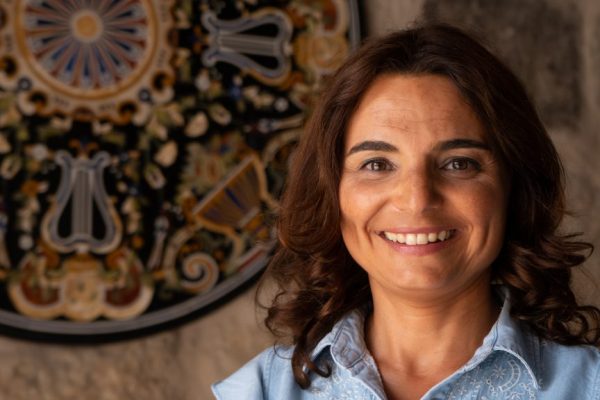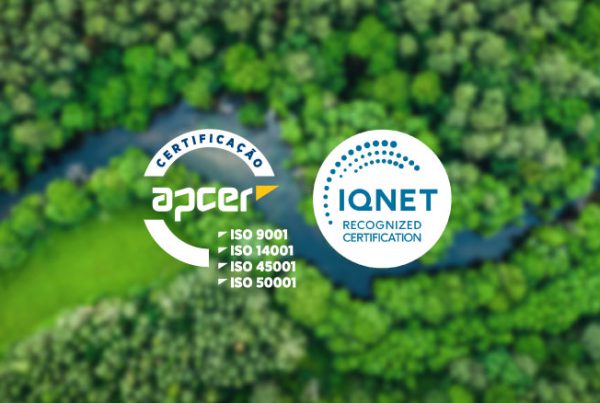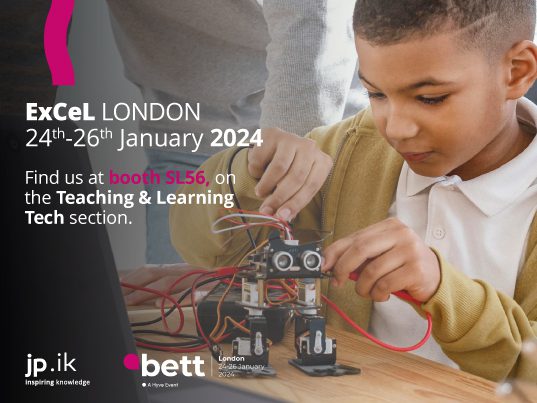Sónia Moreira is a teacher from Vila Nova de Gaia, Portugal, and creator of the Coopera project, based on the pedagogical model of cooperative learning. In 2020 she was awarded Teacher of the Year by the Global Teacher Prize and is now in the Top 50 of the global competition.
You wanted to be a teacher since you were 5 years old. What inspired you (and continues to inspire you)?
First, the love for listening to the stories my mother used to tell me so well with books or without them. I recounted these stories to my dolls by reading the images from those same books or imagining the scenarios of those told without books.
At the age of seven, I was already helping my teacher with passion and dedication, in a tutoring that extended after the school term. I used to receive at home classmates and other girls from the street where I lived, whom I loved to guide in carrying out the work, replicating the excellent example of my teacher. My vocation was reinforced in adolescence, as a mentor to a classmate who had recently arrived from South Africa. The challenges were to help her learn to communicate in Portuguese and facilitate her inclusion process. A mission that I fulfilled with all the dedication and some success. It became increasingly clear that this was the path I would choose to follow in adulthood.
Given the above, it’s easy to tell that my first sources of inspiration were my mother and my first teacher. Currently, my main inspirational references are other teachers, but also students and guardians.
What changed for you in a professional (and personal) capacity by having this recognition of the Global Teacher Prize?
The Global Teacher Prize (GTP) is like a Nobel Prize in Education, which recognizes the value of the pedagogical work of enterprising and inspiring teachers, where they reflect in their projects the transforming power of Education.
I had the immense joy of being honored with this award, in Portugal, as Teacher of the Year in 2020. Public recognition and the appreciation of a lifetime of investment in a professional career as a teacher, a choice I made in the first option, was, is and it will always be an unforgettable milestone in my personal and professional life.
This award gave me direct access to the GTP 2021 global competition, which is one of the most important awards in the field of Education. After submitting the application of 12,000 teachers, I am extremely honored to be able to be in the TOP 50 representing Portugal, and all Portuguese teachers who in any year (typical or atypical), face the difficulties, find answers, in a timely matter for students to develop their skills in the most responsible, inclusive and attractive way possible.
In short, for me this award values and praises all teachers who believe it is possible to promote quality education in any country.
What are the main challenges you faced in the creation and development of the Coopera Project?
The persistent dream of wanting to have a school where each child felt special, unique, belonging to this space, to this community that is also theirs and that allows them to grow and form in an involved, participatory and happy way, gave birth to a project of pedagogical intervention named COOPERA, based on the pedagogical model of Cooperative Learning. As a mentor of the project, one of the main challenges was being able to stand out, to coordinate the Coopera that involved the five schools of the Escultor António Fernandes de Sá School school group. We are talking about 29 classes (Pre-School to Grade 9), 60 teachers, 730 students, with continuous training in context and with the application of 14,282 surveys, ensuring, in this way, the monitoring of all the work carried out.
Currently, the main challenge is to be able to increase the work team. The requests are immense and in these last 3 years Coopera, supported by Cooperative Learning, reached 20 schools, 150 classes (Pre-School to 9th Grade and some secondary education classes), 350 Teachers and 3,000 students.
You wanted to be a teacher since you were 5 years old. What inspired you (and continues to inspire you)?
First, the love for listening to the stories my mother used to tell me so well with books or without them. I recounted these stories to my dolls by reading the images from those same books or imagining the scenarios of those told without books.
At the age of seven, I was already helping my teacher with passion and dedication, in a tutoring that extended after the school term. I used to receive at home classmates and other girls from the street where I lived, whom I loved to guide in carrying out the work, replicating the excellent example of my teacher. My vocation was reinforced in adolescence, as a mentor to a classmate who had recently arrived from South Africa. The challenges were to help her learn to communicate in Portuguese and facilitate her inclusion process. A mission that I fulfilled with all the dedication and some success. It became increasingly clear that this was the path I would choose to follow in adulthood.
Given the above, it’s easy to tell that my first sources of inspiration were my mother and my first teacher. Currently, my main inspirational references are other teachers, but also students and guardians.
What changed for you in a professional (and personal) capacity by having this recognition of the Global Teacher Prize?
The Global Teacher Prize (GTP) is like a Nobel Prize in Education, which recognizes the value of the pedagogical work of enterprising and inspiring teachers, where they reflect in their projects the transforming power of Education.
I had the immense joy of being honored with this award, in Portugal, as Teacher of the Year in 2020. Public recognition and the appreciation of a lifetime of investment in a professional career as a teacher, a choice I made in the first option, was, is and it will always be an unforgettable milestone in my personal and professional life.
This award gave me direct access to the GTP 2021 global competition, which is one of the most important awards in the field of Education. After submitting the application of 12,000 teachers, I am extremely honored to be able to be in the TOP 50 representing Portugal, and all Portuguese teachers who in any year (typical or atypical), face the difficulties, find answers, in a timely matter for students to develop their skills in the most responsible, inclusive and attractive way possible.
In short, for me this award values and praises all teachers who believe it is possible to promote quality education in any country.
What are the main challenges you faced in the creation and development of the Coopera Project?
The persistent dream of wanting to have a school where each child felt special, unique, belonging to this space, to this community that is also theirs and that allows them to grow and form in an involved, participatory and happy way, gave birth to a project of pedagogical intervention named COOPERA, based on the pedagogical model of Cooperative Learning. As a mentor of the project, one of the main challenges was being able to stand out, to coordinate the Coopera that involved the five schools of the Escultor António Fernandes de Sá School school group. We are talking about 29 classes (Pre-School to Grade 9), 60 teachers, 730 students, with continuous training in context and with the application of 14,282 surveys, ensuring, in this way, the monitoring of all the work carried out.
Currently, the main challenge is to be able to increase the work team. The requests are immense and in these last 3 years Coopera, supported by Cooperative Learning, reached 20 schools, 150 classes (Pre-School to 9th Grade and some secondary education classes), 350 Teachers and 3,000 students.
What are the main challenges you face in continuing training in the context of teachers of the Coopera Project?
The combination of working hours of the teachers involved is one of the main challenges. Another even greater challenge is to be able to respond to the numerous requests that come from teachers from different schools and regions of our country, since continuous training in context implies being in the classroom, monitoring, participating and assisting the teachers involved in the Cooperative Communities of Professional Learning.
The democratization of Cooperative Learning through the creation of a web platform that is already under development, appears as a possibility to respond to this challenge. Through it, we will be able to reach more students and teachers and thus provide:
- pedagogical resources to support Cooperative Learning classes;
- surveys for monitoring (validated scales to assess: Classroom climate; Self-efficacy; Social Skills; Creativity; Motivation; Academic achievement;
- automatic reports (customized dashboards depending on the profile: student, teacher, coordinator, director, guardian);
- training (integrated training environment in Cooperative Learning);
- application for mobile devices (android and IOS).
What are the main challenges that teachers report in implementing collaborative learning methodologies?
The need to have more hours (time) of collaborative work included in the working hours.
How do you view technology inside (and outside) the classroom in a collaborative learning context?
Technology is definitely at the service of pedagogy. Technology makes it possible to use a greater diversification of instruments and techniques not only to gather information, but also to develop a set of cognitive, social, emotional, creative skills provided for in the Profile of Students Leaving Mandatory Schooling (PASEO, 2017), enabling the formation of each student as complete and harmonious as possible.
What are the main changes you have seen in the process and demands of the education system over the years?
Like the health system, the educational system and all the professionals who work in it also need to be constantly updated. The requirements are above all at the level of a paradigm shift in the teaching-learning process, which is intended to be more collaborative and technological (and less transmissive), making use of different methodologies and learning environments. It is also necessary that we, teachers, are even more human, keeping alive the pedagogy of affection and proximity (even if digital), where each student is a student, adopting a more humanistic, inclusive, coherent and flexible paradigm, supported by the pedagogy of example.
The combination of working hours of the teachers involved is one of the main challenges. Another even greater challenge is to be able to respond to the numerous requests that come from teachers from different schools and regions of our country, since continuous training in context implies being in the classroom, monitoring, participating and assisting the teachers involved in the Cooperative Communities of Professional Learning.
The democratization of Cooperative Learning through the creation of a web platform that is already under development, appears as a possibility to respond to this challenge. Through it, we will be able to reach more students and teachers and thus provide:
- pedagogical resources to support Cooperative Learning classes;
- surveys for monitoring (validated scales to assess: Classroom climate; Self-efficacy; Social Skills; Creativity; Motivation; Academic achievement;
- automatic reports (customized dashboards depending on the profile: student, teacher, coordinator, director, guardian);
- training (integrated training environment in Cooperative Learning);
- application for mobile devices (android and IOS).
What are the main challenges that teachers report in implementing collaborative learning methodologies?
The need to have more hours (time) of collaborative work included in the working hours.
How do you view technology inside (and outside) the classroom in a collaborative learning context?
Technology is definitely at the service of pedagogy. Technology makes it possible to use a greater diversification of instruments and techniques not only to gather information, but also to develop a set of cognitive, social, emotional, creative skills provided for in the Profile of Students Leaving Mandatory Schooling (PASEO, 2017), enabling the formation of each student as complete and harmonious as possible.
What are the main changes you have seen in the process and demands of the education system over the years?
Like the health system, the educational system and all the professionals who work in it also need to be constantly updated. The requirements are above all at the level of a paradigm shift in the teaching-learning process, which is intended to be more collaborative and technological (and less transmissive), making use of different methodologies and learning environments. It is also necessary that we, teachers, are even more human, keeping alive the pedagogy of affection and proximity (even if digital), where each student is a student, adopting a more humanistic, inclusive, coherent and flexible paradigm, supported by the pedagogy of example.
Contribution by:
Sónia Moreira
Teacher of the Escultor António Fernandes de Sá school group, in Vila Nova de Gaia. Sónia is a Basic Education teacher (primary) and is the coordinator of the primary school department.
She is also the author and coordinator of the COOPERA Project since October 2016, under implementation during the biennium 2016/2017 2017/2018, as one of the measures of the Strategic Action Plan of the cluster to which she belongs.
Teacher trainer since 2010, in different areas and domains, and collaborator in textbook projects.




